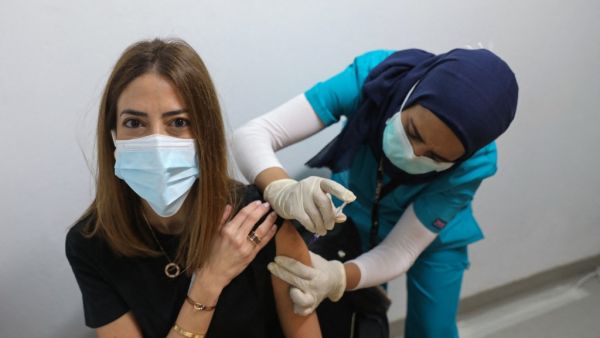Lebanon received its second shipment of the coronavirus vaccine Saturday, containing around 31,500 Pfizer-BioNTech vaccines, according to local media.
Lebanon is expecting weekly shipments of the Pfizer-BioNTech vaccine, as the first shipment of around 28,500 doses arrived on Feb. 13.
First batch of Pfizer COVID vaccines arrive in Lebanon https://t.co/0cB7WFkK2d
— Haaretz.com (@haaretzcom) February 14, 2021
Lebanon has so far reserved around 6.3 million coronavirus vaccine doses, which are enough to inoculate around half the population as each person needs two doses for full effect.
The government has secured 2.1 million jabs of the Pfizer-BioNTech vaccine, 2.7 million doses through the COVAX platform which includes jabs of the Oxford-AstraZeneca vaccine, in addition to Novavax and Pfizer-BioNTech vaccines. The government signed a separate agreement with Oxford-AstraZeneca for another 1.5 million jabs, the caretaker health minister said Friday. Lebanon has also authorized the use of the Russian Sputnik vaccine.
Nearly 8,000 people have been vaccinated since the inoculation drive was launched Sunday.
Front line health workers and those over the age of 75 are taking the vaccine at this stage in accordance with the government’s national vaccination plan.
Next in line are all those between the ages of 65 and 74 and people between the ages of 55 and 64 with pre-existing health conditions.
The government aims to achieve herd immunity by year end or by the beginning of 2020 by vaccinating between 70 to 80 percent of the population.
Vaccination campaign continues in hospitals & medical centers all over #Lebanon
— Larissa Aoun (@LarissaAounSky) February 17, 2021
1st stage going slowly & dedicated to medical team & elderly above 75.
New batch of #Pfizer expected this Saturday.
LAUMC got approval from MOPH & launched negotiations to provide more quantities... pic.twitter.com/vjEiLBVUve
Taking the vaccine isn’t obligatory. Around 650,000 people of a nearly 6 million population have so far signed up to get it.
This article has been adapted from its original source.








